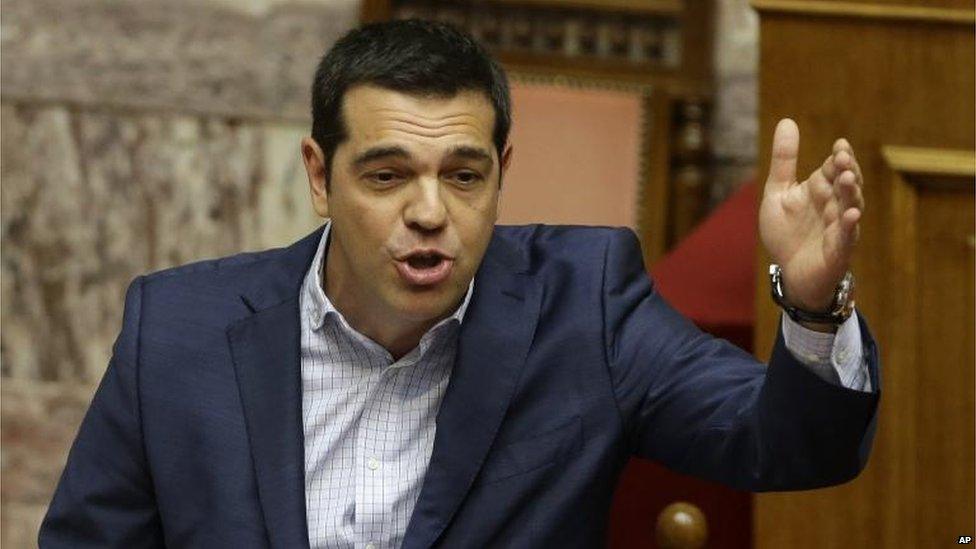Would a third Greek bailout work?
- Published
- comments

Greek prime minister Alexis Tsipras remains a popular leader
I haven't been in Greece for three weeks but I am told it is eerily quiet and - in respect of tourism - surprisingly busy.
No demos on the streets of Athens - even though the Syriza government is poised to agree and implement yet more austerity and liberalisation measures, mandated by creditors and of the ilk that till recently it characterised as hateful.
And Greece's resorts are teeming: Athens airport expects 25 million arrivals this year, up from 21 million; the incremental 4 million are not all eurozone and IMF officials intent on turning the country into a protectorate run from Brussels, Frankfurt and Washington (home of the IMF).
Maybe holidaymakers were hoping to be on the ground for euro break-up history. Or more likely Greece simply looks like a wonderful place to take the kids compared with resorts closer to territory controlled by the so-called Islamic State.
But why aren't the Greeks manning the barricades in protest against already-announced, painful VAT increases and pension cuts, and in anticipation of swingeing reductions in farm subsidies, controversial privatisations and the opening of professions and industries to the harsh wind of competition?
Well it may be the calm before the revelation later this week of just how much Alexis Tsipras has conceded to obtain €86bn of new credit from the eurozone and (well maybe) the IMF, in the third bailout of this cripplingly indebted country.
Surely at the very least Greek citizens will be curious to learn why Mr Tsipras is rushing to agree terms that he and his colleagues eschewed when elected at the turn of the year.
Presumably the explanation is that Greece's near-death experience in July - the closure of banks and the collapse of economic activity - turned Syriza into disciples of TINA ("there is no alternative").
What is striking of course is that Tsipras remains remarkably popular, in spite of conspicuously failing to deliver an end to fiscal (tax and spending) austerity.
Worse, his standoff with the rest of the eurozone has saddled Greece with monetary austerity too: the continued partial closure of the banks mean they have no money to lend.
Not that many Greek companies have the confidence to ask for a loan for investment, but if retailers and wholesalers can't get adequate credit to obtain credit from abroad, Christmas will be cancelled (70% of shops' orders are placed in September and October, bankers tell me).
There is the vice, in both senses of the word. Greece is suffering from a vicious economic squeeze, which will undoubtedly further impoverish Greek people.
So for all the relief throughout the eurozone that Syriza has finally been battered into submission, the new bailout will only hold if Tsipras can offer hope of better times ahead.
Many would say that good economics and politics requires creditors to ease the burden of Greece's unsustainably large debts by between a third and a half.
So if this new bailout deal is to be that extraordinary thing, a path to genuine recovery, Brussels and - especially - Berlin will need to avoid triumphalism and manifest debt forgiveness in the face of Athens' capitulation.